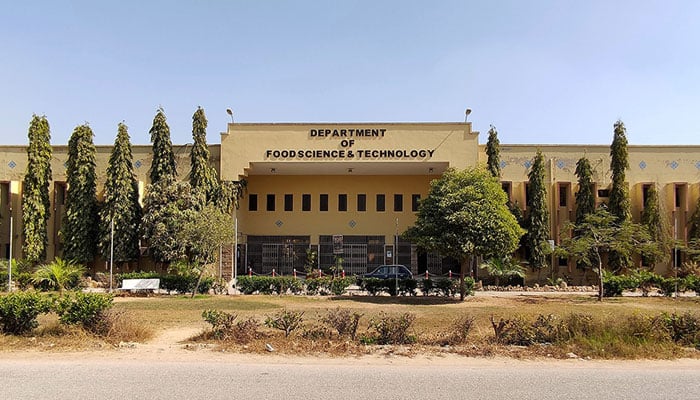Study reveals high trans-fat commonly consumed at university cafeterias
Islamabad:A recent study conducted by the Food Technology Department at the University of Karachi has shed light on concerning levels of industrially produced trans-fats (iTFAs) in commonly consumed food products in university cafeterias. The study, sponsored by Pakistan Youth Change Advocates (PYCA) under the TRANSFORM Pakistan campaign, aims to address the health risks associated with trans-fat consumption and advocates for regulatory measures to improve food quality and safety.
The study focused on assessing the nutritional composition of the five most consumed food items served in various cafeterias across university campuses, with a particular emphasis on trans-fat content. The findings revealed that Paratha, a staple food item consumed by students, contained trans-fat levels beyond the 2% limit defined by the World Health Organisation (WHO) and the Pakistan Standards and Quality Control Authority (PSQCA). This poses a significant public health concern, as excessive trans-fat consumption is associated with various chronic diseases, including cardiovascular disorders, diabetes, Alzheimer’s and cancer.
Parkash Meghwar, the lead researcher of the study, highlighted the urgency of addressing the issue: "The presence of high levels of trans-fats in commonly consumed food products such as parathas on campus poses a serious threat to the well-being of the students. Immediate action is needed to regulate trans-fat content in all food items and ensure the provision of healthier alternatives."
Speaking on behalf of PYCA, Huma Jehangir, Programme Implementation Lead said, “This study conducted at the University of Karachi is one example of how young people are responding to the TRANSFORM Pakistan campaign and actively highlighting the urgency for regulating industrially produced trans-fats to less than 2 per cent of the total fat in all foods across Pakistan.”
Dr. S.M. Ghufran, Assistant Professor, Department of Food Science and Technology, University of Karachi, while commenting on the situation shared, “Based on the study findings, implementing regulations to limit the presence of trans-fats in our dietary sources and curbing the use of partially hydrogenated vegetable oils, a major source of trans fats, is essential to protect public health in Pakistan.” Discussing the need to work closely with young people, Dr. Ghufran added, “It is commendable that PYCA is working to address the issue of trans-fat in educational institutions, an area that has not received adequate attention in the past. Over the past few decades, several chronic diseases, including obesity, cardiovascular disease, high blood pressure, and hypertension, have been increasingly observed among young people. Therefore, taking timely action to address this issue in all educational institutions nationwide would be beneficial.”
PYCA, as the sponsor of this research under the TRANSFORM Pakistan campaign, is committed to engaging media and youth across the country to advocate for regulating iTFAs in dietary sources. Through collaborative efforts, policymakers, health professionals, and consumers can work together to reduce the health risks associated with trans-fat consumption and improve the overall quality of the food supply.
-
 Demi Lovato Leaves Fans Disappointed With Unexpected Announcement
Demi Lovato Leaves Fans Disappointed With Unexpected Announcement -
 Pacers Vs Knicks Overtime Thriller Ends In Heartbreak For New York
Pacers Vs Knicks Overtime Thriller Ends In Heartbreak For New York -
 Who Owns The Ambassador Bridge? New Report Links Owner Matthew Moroun To Trump’s Threat
Who Owns The Ambassador Bridge? New Report Links Owner Matthew Moroun To Trump’s Threat -
 ICE Detention Center Plan Sparks Controversy In Maryland As Lawmakers Push Back
ICE Detention Center Plan Sparks Controversy In Maryland As Lawmakers Push Back -
 Blood Pressure Medication Recalled After Wrong Tablets Found In Bottles
Blood Pressure Medication Recalled After Wrong Tablets Found In Bottles -
 Why Ariana Grande Wants A 'tiny Mouse' To Play Her In Biopic?
Why Ariana Grande Wants A 'tiny Mouse' To Play Her In Biopic? -
 Wind Chill Returns With Brutal Cold As Polar Vortex Stalls Over Canada
Wind Chill Returns With Brutal Cold As Polar Vortex Stalls Over Canada -
 Princess Beatrice, Eugenie ‘do Not Want To Be Seen In Public’ Because Of Dad
Princess Beatrice, Eugenie ‘do Not Want To Be Seen In Public’ Because Of Dad -
 Costco $20 Rule Explained As Employee Pay Climbs Across North America
Costco $20 Rule Explained As Employee Pay Climbs Across North America -
 Strange Incident Happened At Nancy Guthrie's Home On Abduction's 10th Day
Strange Incident Happened At Nancy Guthrie's Home On Abduction's 10th Day -
 Tumbler Ridge School Lockdown Underway As RCMP Investigate School Shooting
Tumbler Ridge School Lockdown Underway As RCMP Investigate School Shooting -
 Royal Family Knows There Can Be ‘no More Glossing’ Of Andrew Downfall
Royal Family Knows There Can Be ‘no More Glossing’ Of Andrew Downfall -
 Britney Spears Quietly Parts Ways With Her Music Catalog: Report
Britney Spears Quietly Parts Ways With Her Music Catalog: Report -
 Princess Diana Bodyguard Suspected ‘she Could Die’: Here’s How
Princess Diana Bodyguard Suspected ‘she Could Die’: Here’s How -
 Teddi Mellencamp Marks Huge Milestone With Emotional Message Amid Cancer
Teddi Mellencamp Marks Huge Milestone With Emotional Message Amid Cancer -
 Shamed Andrew To ‘kiss And Tell’ After Dip In Popularity
Shamed Andrew To ‘kiss And Tell’ After Dip In Popularity




